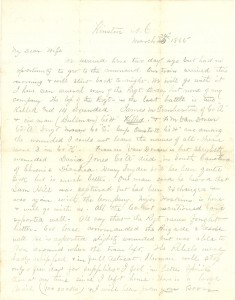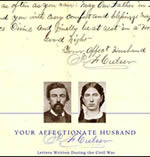 [google-map-v3 width=”400″ height=”300″ zoom=”12″ maptype=”hybrid” mapalign=”right” directionhint=”false” language=”default” poweredby=”false” maptypecontrol=”false” pancontrol=”false” zoomcontrol=”true” scalecontrol=”false” streetviewcontrol=”false” scrollwheelcontrol=”false” addmarkermashupbubble=”false” addmarkerlist=”35.23719; -81.209419{}1-default.png” bubbleautopan=”true” showbike=”false” showtraffic=”false” showpanoramio=”false”]
[google-map-v3 width=”400″ height=”300″ zoom=”12″ maptype=”hybrid” mapalign=”right” directionhint=”false” language=”default” poweredby=”false” maptypecontrol=”false” pancontrol=”false” zoomcontrol=”true” scalecontrol=”false” streetviewcontrol=”false” scrollwheelcontrol=”false” addmarkermashupbubble=”false” addmarkerlist=”35.23719; -81.209419{}1-default.png” bubbleautopan=”true” showbike=”false” showtraffic=”false” showpanoramio=”false”]
Kinston, N.C. March 24th 1865
My Dear Wife
We arrived here two days’ ago but had no opportunity to get to the command.1 Our train arrived this morning & will start back to-night; we will go with it. I have seen several men of the Regt. to-day, but none of my company. The loss of the Regt. in the last battle [Averysboro] is two killed and 14 wounded. James M. Pemberton of Co. “A”, & one man (Bullman) Co. “H”, Killed; & F. M. Van Doren, Co. “A”, Sergt. Mason, Co. “E”, Corp. Onstott, Co. “H” are among the wounded.2 I could not learn the names of all. There were three in Co. “K”. Francis Van Doren is but slightly wounded. David Jones, Co. “A”, died in South Carolina of Chronic Diarrhea.3 Henry Snyder, Co. “A”, has been quite sick but is much better.4 One man said he heard that Sam Hill was captured but had been exchanged & was again with the Company.5 Major Hoskins is here & will go with us. All the Co. not mentioned are reported well.
All say that the Regt. never fought better. Col. Case commanded the Brigade & did well. He is reported slightly wounded but was able to run around when the train left.6 The Rebels were badly whipped & in full retreat.7 Sherman will stop only a few days for supplies. I feel in better spirits than at any time since I left home. There is a large mail (100 sacks), & I will hear from you soon.
It is very windy and dusty. My health is excellent. The boys represent the trip from Savannah as very severe, yet they lived well. The country has been very Swampy. The train brought several hundred families of refugees, & they sit in groups all around the field. It looks terrible. Both young & old without any one to protect or provide for them, surrounded with soldiers & doubtless often insulted by reckless men.
Remember me in love to all. Tell [John] Smith the result of the battle as soon as you can so that he can inform Pemberton’s family. He was a brave & noble soldier. May God bless & protect you & make you happy. I will write as soon after my arrival at the command as possible.
Good Bye.
Your affect. Husband
J. F. Culver
- Captain Culver had traveled the 32 miles from New Bern to Kinston by rail. Goldsboro, where Sherman had rendezvoused with Schofield, was 24 miles west of Kinston. At 2 A.M. on the 24th the 129th Illinois had been turned out by an alarm, and five hours later the regiment broke camp at Waynesboro, on the final leg of its 55-day march from Hardeeville. At noon, the regiment entered Goldsboro, their route passing Sherman’s headquarters. Sherman stood bareheaded as the troops marched by with bands playing. The regiment, along with other units of the Third Division, camped two miles north of Goldsboro. Grunert, History of the 129th Illinois, p. 223. [↩]
- According to the regimental returns, two men were killed and 17 wounded at Averysboro on March 16. Two of the wounded subsequently died. The three wounded in Company K were: Corp. Andrew Salgman, and Pvts. Joseph Caley and Philip Wilderwood. O. R., Ser. I, Vol. XLVII, pt. I, p. 799; Regimental Papers, 129th Illinois, NA, RG 94. James M. Pemberton, a 23-year-old farmer, was mustered into service on Sept. 8, 1862, as a private in Company A, 129th Illinois Infantry. He was killed in action at Averysboro, March 16, 1865, Edwin P. Bulmer, a 32-year-old shoemaker, was mustered into service on Sept. 8, 1862, as a private in Company H, 129th Illinois Infantry. Private Bulmer was mortally wounded in the chest at Averysboro and died the next day in a field hospital. Francis M. Vandoren, a 24-year-old farmer, was mustered into service on Sept. 8, 1862, as a private in Company A, 129th Illinois Infantry. From April 27, 1864, until autumn, he was detailed as a teamster in the supply train, Third Division, XX Corps. Wounded at Averysboro, Private Vandoren was mustered out with the regiment on June 8, 1865, near Washington, D.C. Otis S. Mason, a 30-year-old blacksmith, was mustered into service on Sept. 8, 1862, as a sergeant in Company E, 129th Illinois Infantry. Sergeant Mason was wounded at Averysboro, and was hospitalized at Quincy, Ill., where he was medically discharged on March 25, 1865. John H. Onstot, a 35-year-old clerk, was mustered into service on Sept. 8, 1862, as a corporal in Company H, 129th Illinois Infantry. Onstot was promoted to sergeant on May 16, 1864, and was wounded at Averysboro. He was given a medical discharge while hospitalized at Madison, Indiana, on May 25, 1865. Compiled Service Records of Union Troops, NA. [↩]
- David Jones, a 37-year-old miner, was mustered into service on Sept. 8, 1862, as a private in Company A, 129th Illinois Infantry. Private Jones died on March 3, 1865, at Chesterfield, S.C., of a “congestive chill.” Ibid. [↩]
- Henry E. Synder, a 20-year-old farmer, was mustered into service on Sept. 8, 1862, as a private in Company A, 129th Illinois Infantry. He was mustered out near Washington, D.C. on June 8, 1865. Ibid. [↩]
- Nathan W. Hill, a 24-year-old farmer, was mustered into service on Sept. 8, 1862, as a private in Company A, 129th Illinois Infantry. He was promoted to corporal on Dec. 30, 1862, and to sergeant on May 9, 1863. Sergeant Hill was discharged on June 8, 1865, near Washington, D.C. Ibid. [↩]
- General Ward reported that at Averysboro, he “directed Colonel Case to move with the First Brigade well around to the left and feel for the rebel flank, at the same time directing Colonel Dustin and General Cogswell to press the enemy in their front. I cannot speak too highly of the manner in which Colonel Case executed this movement.” The 1st Brigade led by Colonel Case closed on the Confederate flank, just as Dustin’s men swept over their earthworks. The Southerners took to their heels, leaving three cannon and 100 prisoners, not counting 68 wounded, in the Federal’s hands. O. R., Ser. I, Vol. XLVII, pt. I, p. 784. [↩]
- Following the battle of Bentonville and the occupation of Goldsboro by Schofield’s army, General Johnston retired northward to the Smithfield area. Here astride the North Carolina Railroad, he would be in a position to cover Raleigh, if, as expected, it proved to be Sherman’s next goal on his march through North Carolina. O. R., Ser. I, Vol. XLVII, pt. II, pp. 1453-54. [↩]

 Subscribe via RSS
Subscribe via RSS Subscribe via Email
Subscribe via Email